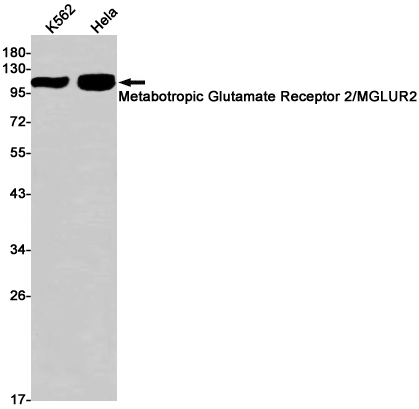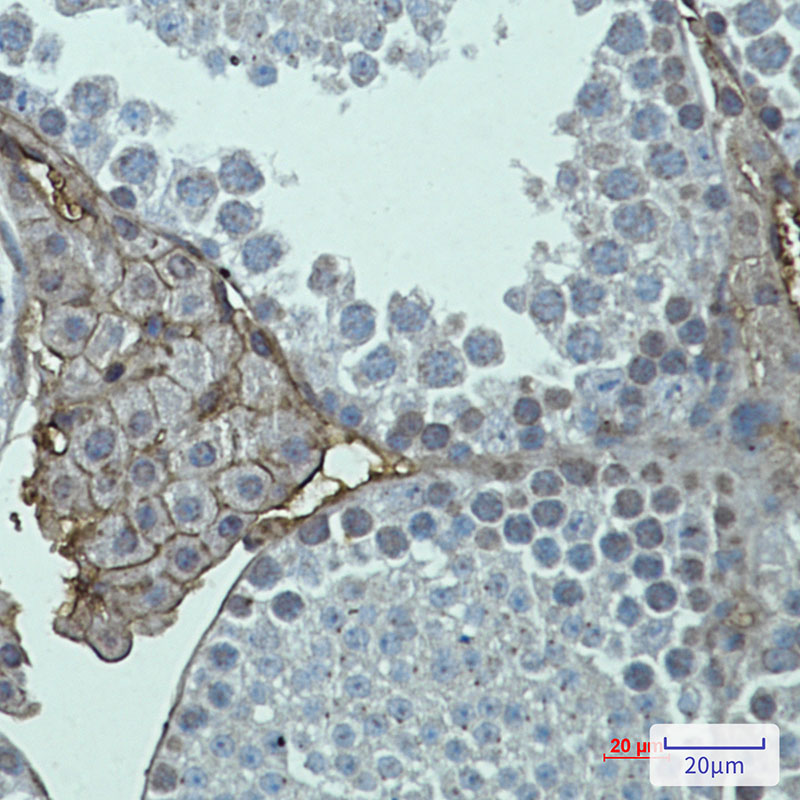

| WB | 1/500-1/1000 | Human,Mouse,Rat |
| IF | 咨询技术 | Human,Mouse,Rat |
| IHC | 1/50-1/100 | Human,Mouse,Rat |
| ICC | 技术咨询 | Human,Mouse,Rat |
| FCM | 咨询技术 | Human,Mouse,Rat |
| Elisa | 咨询技术 | Human,Mouse,Rat |
| Aliases | GRM2; GPRC1B; MGLUR2; Metabotropic glutamate receptor 2; mGluR2; GRM3; GPRC1C; MGLUR3; Metabotropic glutamate receptor 3; mGluR3 |
| Entrez GeneID | 2912 |
| WB Predicted band size | Calculated MW: 96 kDa; Observed MW: 99 kDa |
| Host/Isotype | Rabbit IgG |
| Antibody Type | Primary antibody |
| Storage | Store at 4°C short term. Aliquot and store at -20°C long term. Avoid freeze/thaw cycles. |
| Species Reactivity | Human,Mouse |
| Immunogen | A synthetic peptide of human Metabotropic Glutamate Receptor 2 |
| Formulation | Purified antibody in TBS with 0.05% sodium azide,0.05%BSA and 50% glycerol. |
+ +
以下是关于代谢型谷氨酸受体2(mGluR2)抗体的3篇参考文献的简要总结:
1. **"Antibodies against metabotropic glutamate receptor 2 in neuropsychiatric disorders"**
- **作者**: Nicoletti, F., et al.
- **摘要**: 该研究探讨了mGluR2抗体在精神分裂症和焦虑症模型中的作用,发现其通过调节受体活性影响突触可塑性,提示其在神经精神疾病中的潜在治疗价值。
2. **"Characterization of a monoclonal antibody targeting the extracellular domain of mGluR2"**
- **作者**: Cartmell, J., et al.
- **摘要**: 描述了一种特异性靶向mGluR2胞外结构域的单克隆抗体的开发与验证,证明其在体外和脑组织切片中能选择性抑制受体功能,为研究mGluR2信号通路提供了工具。
3. **"Therapeutic potential of mGluR2-selective antibodies in neurodegenerative diseases"**
- **作者**: Lavreysen, H., et al.
- **摘要**: 研究利用mGluR2特异性抗体在阿尔茨海默病模型中的效果,发现其通过减少β-淀粉样蛋白毒性改善认知功能,支持其作为神经退行性疾病治疗策略的潜力。
**备注**:部分文献可能涉及抗体作为研究工具或治疗手段,若需具体文章细节,建议通过PubMed或Google Scholar按标题/作者进一步检索。
The metabotropic glutamate receptor 2 (mGluR2) is a class C G protein-coupled receptor (GPCR) that binds glutamate, the primary excitatory neurotransmitter in the central nervous system. As part of the mGluR family, it modulates synaptic transmission via second messenger systems, primarily coupling to Gαi/o proteins to inhibit adenylate cyclase activity and reduce cAMP levels. mGluR2 is predominantly expressed in presynaptic terminals, where it regulates neurotransmitter release by responding to excessive glutamate, thereby maintaining synaptic homeostasis. It plays a critical role in neuropsychiatric disorders, including anxiety, schizophrenia, and addiction, making it a therapeutic target.
Antibodies targeting mGluR2 are essential tools for studying its expression, localization, and function in both physiological and pathological contexts. These antibodies are validated for applications such as Western blotting, immunohistochemistry, and immunofluorescence, enabling researchers to visualize receptor distribution in brain regions like the prefrontal cortex and hippocampus. Specificity is ensured through epitope mapping, often targeting extracellular or intracellular domains. Recent research explores mGluR2 antibodies in drug development, particularly for ligands that modulate receptor activity to treat neurological conditions. Additionally, they aid in biomarker discovery for diseases linked to glutamatergic dysfunction. Challenges include distinguishing mGluR2 from closely related subtypes (e.g., mGluR3) due to structural homology, necessitating rigorous validation. Overall, mGluR2 antibodies advance our understanding of glutamate signaling and its therapeutic potential.
×